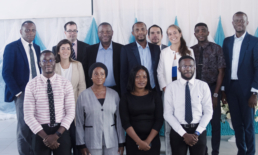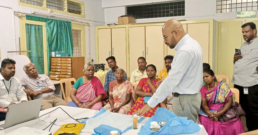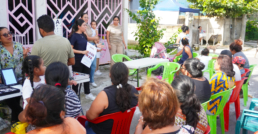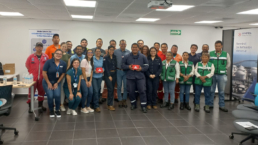EAGLE 2 has launched!
Following on from publication of the EAGLE study last year, we are pleased to announce the launch of EAGLE 2.
EAGLE 2 will be a snapshot audit of patients undergoing right sided bowel anastomosis, but restricted to units who undertake the EAGLE online training. This training may have already been done (as part of the first EAGLE study), or surgeons in your team may complete it between now and May 2024. A key finding from the EAGLE study was that in centres where most surgeons undertook the training, the anastomotic leak rate fell by almost 50%. We need your help to grow engagement across as many hospitals as possible, so we can validate this finding. EAGLE 2 will be open to hospitals who participated in the original EAGLE study as well as new hospitals.
Units who undertake the EAGLE online training (either as part of ’EAGLE’ or between now and May 2024) prior to data collection can take part. The anticipated audit period will be May/June 2024. Results will be presented at ESCP 2024 in September, and published later this year.
You can find out more about the EAGLE study in the below video:
If you have any questions, please contact the team.
EAGLE 2 Launch

EAGLE 2 Launch
Following on from publication of your EAGLE study last year, we are pleased to announce the launch of EAGLE 2. You are invited to join a webinar on Thursday 01st February at 15:00 GMT / 16:00 CET to hear more about the study. Please register your interest here.
EAGLE 2 will be a snapshot audit of patients undergoing right sided bowel anastomosis, BUT restricted to units who undertake the EAGLE online training. This training may have already been done, or surgeons in your team may complete it between now and May 2024. The training platform is available – open access – at https://eagle-escp.eu.com/.
A key finding from the EAGLE study was that in centres where most surgeons undertook the training, the anastomotic leak rate fell by almost 50%. We need your help to grow engagement across as many hospitals as possible, so we can validate this finding.
We anticipate that EAGLE 2 will recruit patients between May - June 2024. The results will be submitted to the BJS for publication after presentation at the ESCP conference in Greece (September 2024).
EAGLE 2 will be open to hospitals who participated in the original EAGLE study as well as new hospitals.
Contact J.Keatley@bham.ac.uk if you have any questions and we hope to see you at the webinar on 01st February.
WOLVERINE Unleashed!
The launch webinar for the latest ESCP audit and cohort study ‘WOLVERINE’ took place on 07th November. The aim of this study is to conduct a prospective cohort study and audit in wound closure and SSI prevention following abdominal surgery.
Presentation
Panel Discussion
Amongst the panellists were GSU hub representatives from Ghana (Prof. Stephen Tabiri, Dr Napoleon Bellua Sam) and India (Dr Parvez David Haque).
WOLVERINE has 2 recruitment periods;
- Period 1: 01st November 2023 to 15th December 2023 (audit only)
- Period 2: 02nd January 2024 to 31st March 2024 (audit + elective cohort study)
Patient recruitment for the period 1 audit is now underway and you can register your centre to join here. More than 160 centres have already registered to participate.
If you have any questions please contact wolverine@contacts.bham.ac.uk.
New Publication: A Prospective, Observational Cost Comparison of Laparoscopic and Open Appendicectomy in Three Tertiary Hospitals in Nigeria
We are pleased to share our latest publication in the World Journal of Surgery from Project LION, which was led by Dr Adewale Adisa at the NIHR Hub in Nigeria.
This study compared the outcome and cost of conventional open and laparoscopic appendectomy for clinically confirmed, uncomplicated, acute appendicitis in a low resource setting. Although the cost effectiveness of laparoscopic surgery has been investigated previously in high human development index (HDI) countries, similar studies are lacking in low and middle HDI countries.
The publication can be found on the following link: https://link.springer.com/article/10.1007/s00268-023-07148-5
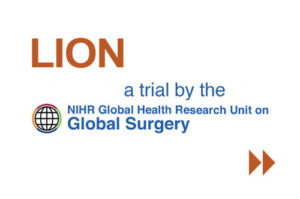
Upcoming Webinar On New WOLVERINE Study
The European Society of Coloproctology (ESCP) latest audit and cohort study, Wound Closure and Surgical Site Infection Prevention Strategies in Abdominal Surgery (WOLVERINE) was launched at the Global Reach Symposium at ESCP's 2023 Conference in Vilnius, Lithuania.
The aim of this study is to conduct a prospective cohort study and audit in wound closure and SSI prevention following abdominal surgery. The study will have two data collection periods, one beginning in November 2023, and a second beginning in January 2024. Interested sites can register here. Sites can take part in either the audit alone (November 2023), or the audit and cohort study (January 2024).
Join our upcoming webinar on 07th November to find out more about WOLVERINE. Book your place at https://www.ticketsource.co.uk/escpstudies.
GSU Research Fellows, Staff Deliver Surgical Research Lectures in Nigeria
Research fellows and staff of the NIHR Global Surgery Unit (GSU) visited Obafemi Awolowo University (OAU) in Ile Ife, Nigeria on the 14th-15th of September 2023 to deliver a series of lectures to medical students, surgical residents and other health care professionals.
The GSU contingent was composed of Dr Dmitri Nepogodiev- Public Health registrar and Academic Clinical Lecturer; Drs Maria Picciochi and Virginia Ledda- Clinical PhD Fellows; Dr Omar Omar- Senior Statistician and Epidemiologist, and Mr Michael Bahrami-Hessari- Community Engagement and Involvement (CEI) manager.

The first lectures delivered on the afternoon of the 14th were aimed at 4th and final year medical students and included fundamental topics on the purpose of research and identifying a good research problem. This was followed by practical advice on how a research abstract is written and how an effective academic poster is constructed. Highlights of the GSU cluster randomised trial CHEETAH and DRAGON- an upcoming trial aiming to compare reusable versus disposable surgical drapes and gowns, were also presented. The session ended with the GSU visitors sharing practical tips on how to develop a career in research.
On the morning of the 15th, a research forum was held specifically for surgical residents and tackled topics such as generating research ideas, getting patient input and choosing the appropriate study design, research ethics, the basics of statistics, presenting and publishing research and how research can influence health guidelines and practice.

Finally, in the afternoon of the same day, a symposium on global surgery was held with a variety of health professionals in attendance. Topics included the sharing of the highlights of our randomised controlled trials (FALCON, CHEETAH, PENGUIN, DRAGON), cohort studies (COVIDSurg, HIPPO), health economics analysis (LION) and our CEI initiatives most notably the development of our community and patient education toolkit.
OAU is a spoke within the Nigeria Hub and has been a top recruiter in GSU trials.
GSU Patient and Community Education Toolkit Launched
The NIHR Global Surgery Unit launched its patient and community education toolkit during its annual meeting in Lagos, Nigeria on the 12th of September 2023. The toolkit is a library of bespoke, localised resources aimed at addressing patient and carer surgical concerns following community consultations across our Hubs in Benin, Ghana, India, Mexico, Nigeria and Rwanda.
From these consultations the most pressing priority identified was caring for surgical wounds at home. To address this, a concise animated video that teaches patients about the signs, symptoms, and self-management of surgical site infections (SSIs) was co-developed with input from stakeholders. The video has been translated into French, Spanish, Twi, Yoruba, Kinyarwanda and Hindi and can be viewed below:
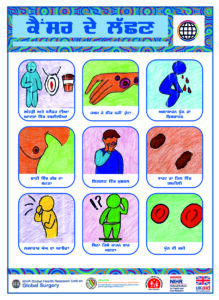
Resources on additional topics identified by the community were also developed. These include early cancer detection, care after laparoscopic surgery, stoma care and what to expect before, during and after surgery. These materials make up the initial version of the dynamic, “living” toolkit which will be continuously refined and expanded as more studies and trials get underway in the unit.
These developed materials will be utilised in community outreach events and post-discharge briefings for our trial participants, and eventually in patient care. They will also be integrated into upcoming trials to evaluate their impact on patients.
India Hub Reaches Milestone of Training 500+ Practitioners in Wound Management
India reaches key milestone in the Unit’s vision to influence the healthcare landscape using results generated in GSU trials, across the Punjab region.
As shown in previous news articles highlighting the India Hub’s Community Engagement and Involvement (CEI) initiative – a key workstream of each of the hubs across the Unit globally, the team have reported the milestone being reached that will increase awareness on how to reduce wound infection incidence and management amongst local community across India, including the Punjab region, Kolkata and Vellore. Dr Rohin Mittal has been leading the engagements at Christian Medical College (CMC) Vellore, Dr Sonia Mathai at Tata Medical Centre (TMC) Kolkata and Dr Deepak Singh at Chinchpadha Christan Hospital (CCH).
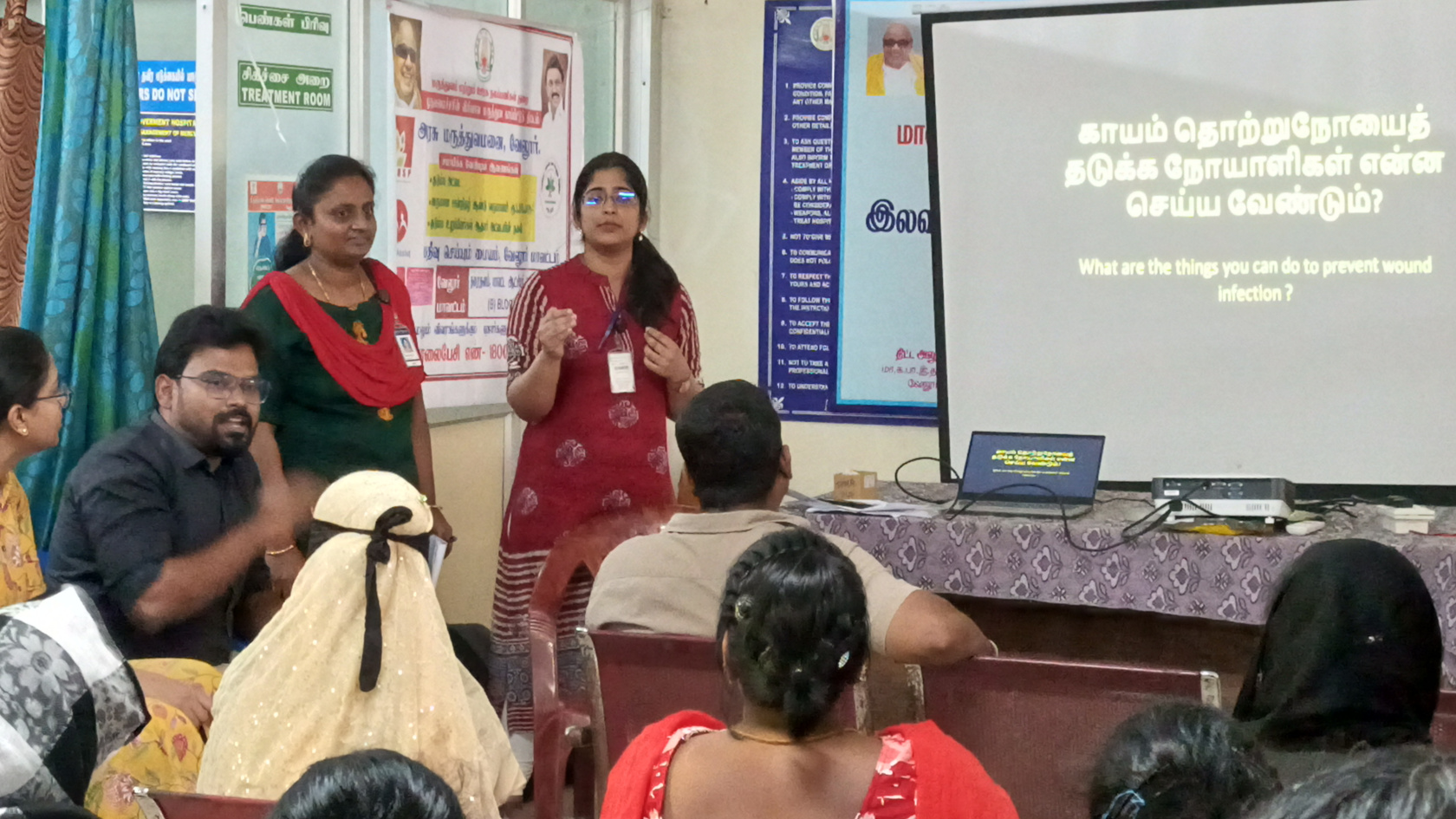
India Hub Manager, Atul Suroy reported that the team have so far managed to travel over 1000km by road where workshops have been co-ordinated in both urban and rural areas, including Doraha, Khanna, Sirhind, Walipur, Hambran, Ayali Kalan, Dakha, Philaur, Raikot, Talwandi Sabo, Barnala and Bathinda. Further to this, Mr. Suroy stated that impact has not only been limited to the community health workers but also local populations, with sessions for local village populations educating them on wound management at home, ointment applications and personal hygiene.
Referral pathways have been created as a result of the various workshops that have taken place, in addition to new channels of communication setup with resident medical practitioners (RMPs’), benefiting the overall footfall of patients accessing the facilities of Christian Medical College in Ludhiana. Recognising the impact of the CEI work undertaken by the hub, the district authority of Punjab has collaborated with GSU CMC to train 2000 accredited Accredited Social Health Ac3vist (ASHAs) of Ludhiana and adjoining 16 districts on Cancer Care, as part of the National Health Mission under the Ministry of Health and Family Welfare (MOHFW) Government of India.
Further information on the evidence generated for the workshops orchestrated across India can be accessed on our FALCON and CHEETAH pages.
For more information on the India team, click here.
Mexico Hub Travels to Mata Cocuite for Wound Infection Prevention Talks
GSU team continue their rollout of community engagement and involvement (CEI) activities in the Veracruz region, during State Department health bridge for local residents.
Research Doctors Melissa Fragoso and Irani Durán were joined by Diana González (Hub Data Manager) and Adda Guzmán (Hub Finance Officer) to continue with their CEI workstream when the team travelled to Mata Cocuite, a small town consisting of approximately 220 inhabitants just outside of Veracruz. The purpose of the visit was to provide information on evidence-based information on recurring issues in daily life relating to the prevention and detection of wound infections and how to safely manage them.
Approximately 30 individuals attended the drop-in to undergo vision exams, vital sign measurements, haircuts, dental check-ups, and medical consultations that took place on the 16th August. As people arrived, the NIHR team gathered them in groups of 10 for a brief talk on wound care and wound infection prevention, delivered by research physicians Dr. Iraní and Dr. Melissa. Additionally, a demonstration was held on how to properly dress minor wounds at home.
Due to their remote location, these communities face challenges in accessing healthcare centres or primary care physicians. Mexico Hub Manager, Dr. Laura Martinez Pérez Maldonado stated that due to the reason it is crucial to educate theses communities on prevention and basic care, reducing the likelehood of such citizens requiring admission to healthcare facilities that may be problematic to access in the first place.
For more information on the evidence used during these talks, you can visit the CHEETAH and FALCON pages on this website.
For more information on the Mexico team, click here.
Mexico Hub Visits Sempra for Workshop on Wound Infection
GSU Hub discuss the prevention and detection of wound infection during community engagement and involvement (CEI) meeting at Sempra energy company in Veracruz.
CEI Manager Nalleley Ortiz and team from the GSU’s Mexico division were given the opportunity on August 17th to speak to collaborators based at Sempra, an energy infrastructure company based in Veracruz that is committed to fostering secure, ecologically responsible, and dependable access to cleaner forms of energy, globally. The workshop that took place enabled the Mexico team to use results obtained from the CHEETAH and FALCON trials co-ordinated across the GSU network.
During the workshop, Nalleley was able to discuss the various work conducted across the hub’s extensive research portfolio and what the team are looking to accomplish with their national CEI workstream. Following on from Nalleley’s discussion, a presentation was given on the prevention and detection of wound infections and surgical site infections (SSI’s). Attendees were afforded the opportunity to pose inquiries, which ultimately led to a wound cleaning simulation orchestrated by a Research Doctor based in the Mexico team.
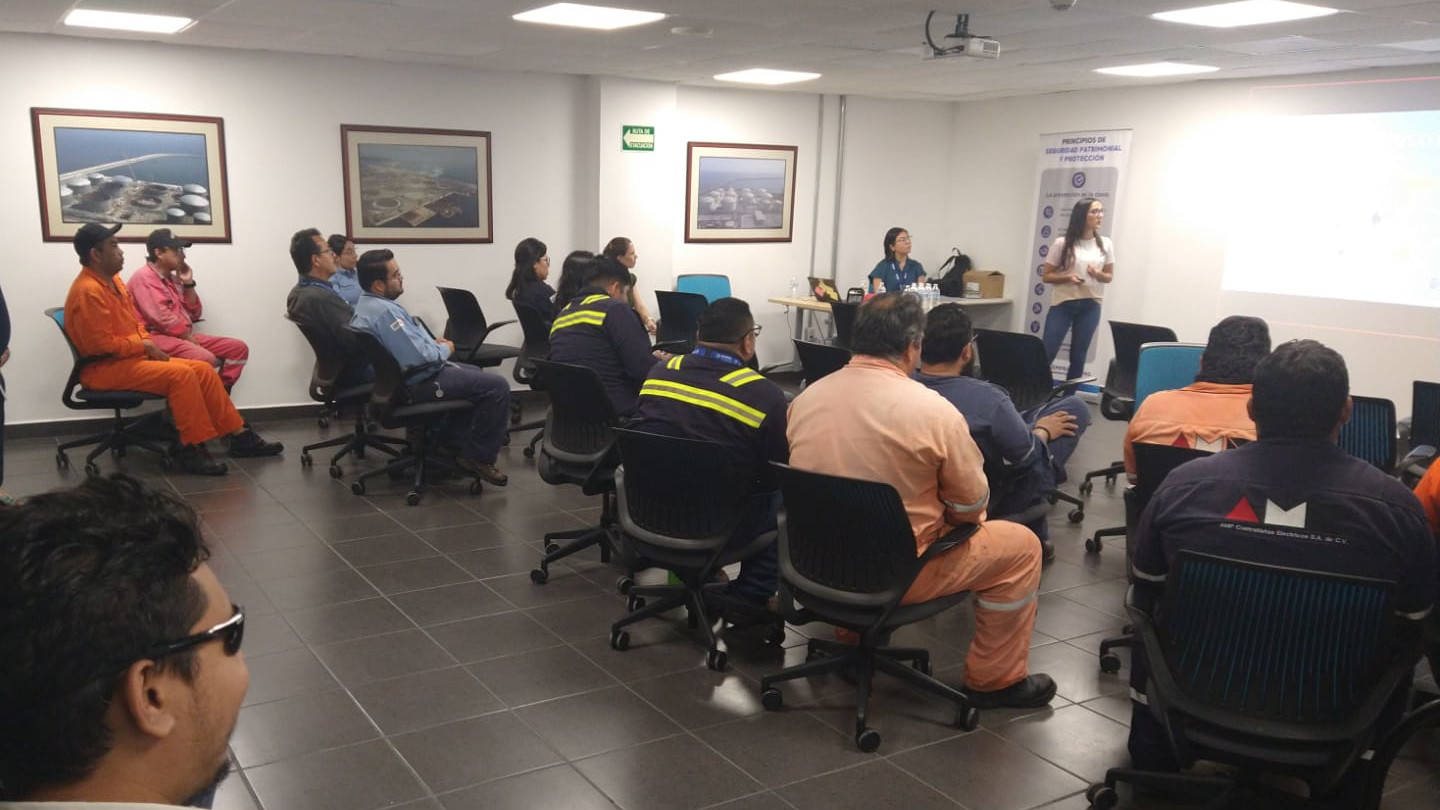
Hub Manager, Dr. Laura Martinez Pérez Maldonado reported that given the prevalence of industries in Veracruz prone to occupational hazards, training in wound infection management could be really beneficial to such organisations. Dr. Pérez Maldonado added that given the geographic separation of these industries from medical facilities and health centres, a deep understanding of these subjects could substantially lower the risk of more severe infections.
More information on the Mexico team can be found by clicking here.






